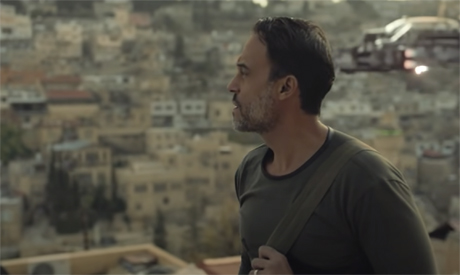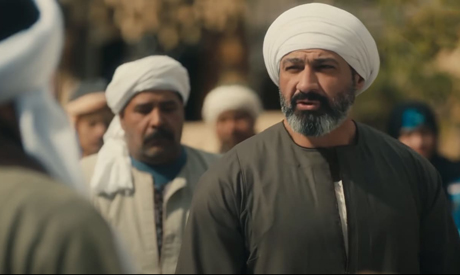Since ancient Greece, no matter the medium, the age-old conflict between good and evil has not stopped haunting drama. The paradigm of a virtuous, selfless and brave hero against a malicious, selfish and careless villain underlies some of this year’s Ramadan TV, too.
Written by Baher Dwedar and directed by Peter Mimi, Al-Ikhtiyar (The Choice, subtitled “A story of loyalty and betrayal”), is based on a true story that President Abdel-Fattah Al-Sisi touched on in one of his speeches when he compared two commando officers. It pits Colonel Ahmed Saber Mansi (played by Amir Karara) — killed during confrontations with Islamist terrorists in Rafah, Sinai, on 7 July 2017 — against Major Hisham Ashmawi (Ahmed Al-Awadi), who joined the Islamic State-affiliate Ansar Beit Al-Maqdis before founding his own Libya-based militia, Al-Morabitoun, only to be captured in May 2019 and executed on 4 March this year.
The series opens with Mansi’s last operation, showing his courage and devotion. Two years later, Ashmawi is seen in custody on the military plane bringing him back from Libya. The first two episodes provide childhood clues as to why the two characters ended up as a hero and a villain. Mansi’s father is a doctor who treats the poor for free, while Ashmawi’s beat him up when he saw him talking to the girl next door as a teenager. As young officers working together, we can see Ashmawi treating the soldiers under his command too harshly and Mansi persuading him to be gentler.
From then on, the series proceeds by showing the two characters’ stories in turn. By adding actual footage and archival photos of real events, notably from 2012, Mimi gives the action credibility. He shows the Rafah attack, Al-Sisi declaring the end of Muslim Brotherhood rule on 3 July, following the 30 June protests, or the Brotherhood sit-ins in Rabaa Al-Adawiya and Al-Nahda squares. With the exception of Al-Awadi’s — who seems to be constrained by the one-dimensional nature of the character — the acting is effective, with cameos by film stars such Karim Mahmoud Abdel-Aziz, Asser Yassin, Mohamed Adel Imam as army personnel striking a powerful chord.
Mimi is well-known for his action work in both TV and commercial cinema — films like Harb Karmouz (Karmouz War) and Casablanca, and series like Kalabsh (Handcuffs) — but thanks to army cooperation the action sequences here are an improvement on previous achievements.

Al-Nihaya
***
Written by Amr Samir Atef and directed by Yasser Sami, the science fiction thriller Al-Nihaya (The End) is set in a post-Israel Jerusalem in 2120 and centres on Zein (Youssef Al-Sherif), an engineer involved in illegal solar energy development who also teaches in a banned school, and his wife Radwa (Nahed Al-Sebaai). In place of states there are now energy companies, with Energy Cubes (EC) serving as the currency, and security forces working for them.
When he flees to a place called Oasis outside Jerusalem, Zein is told that a competing company is willing to support his research, though this seems to be a trick. Meanwhile, Radwa’s workmate Sabah (Sahar Al-Sayegh) has a spare-parts dealer named Aziz (Amr Abdel-Gelil) construct an android identical to Zein but so far only because she is secretly in love with him. With Zein as the protagonist, Moenis (Ahmed Wafiq), a security leader in a Nazi-like costume, is the antagonist.
Al-Nihaya prompted an angry statement from the Israeli foreign policy saying it is “unfortunate and totally unacceptable” that the show should depict the US weakening and breaking up into smaller states while the Arab world gains enough power to launch a war to liberate Jerusalem, prompting an end to the state of Israel as its Jewish inhabitants flee to Europe, to which Atef responded by stressing the fact that it is a work of science fiction.

Al-Fettewa
***
Written by Hani Sarhan and directed by Hussein Al-Manbawi, Al-Fettewa (The Neighbourhood Leader) — set in Cairo in 1850, in the same world as Naguib Mahfouz’s Harafish — is the most obvious take on the good-vs-evil theme. It’s the story of Hassan Al-Ganaini (Yasser Galal), a strongman who helps the poor and fights injustice with his nabbout (or staff, equivalent to a mediaeval knight’s sword). Like Zorro and Batman, Hassan has two identities.
As the son of Al-Gammaliya’s late fetewwa who owns a copper mill and keeps to himself, he is harmless, but as the masked hero who helps those in need he undermines Azmi (Ahmed Salah Hosni), the son Al-Gammaliya’s present, ageing fettewa Saber Abu Shedid (Ahmed Khalil), who unbeknown to his father charges higher and higher protection money and threatens to destroy people’s livelihoods should they refuse to pay.
But there is a fiercer antagonist, Sayed Al-Labban (Riad Al-Kholi), the fettewa of another neighbourhood, whose son Abdou (Mahmoud Amr Yassin) harasses Hassan’s daughter Noura (Laila Ahmed Zaher) and whose men destroy some of the goods in his shop. Al-Labban is also seen killing the head of the jewellers’ guild Beshr (Mohamed Hassib) and kidnapping his own divorcee, Leil Abu Shedid (Mai Omar).
*A version of this article appears in print in the 7 May, 2020 edition of Al-Ahram Weekly
Short link: